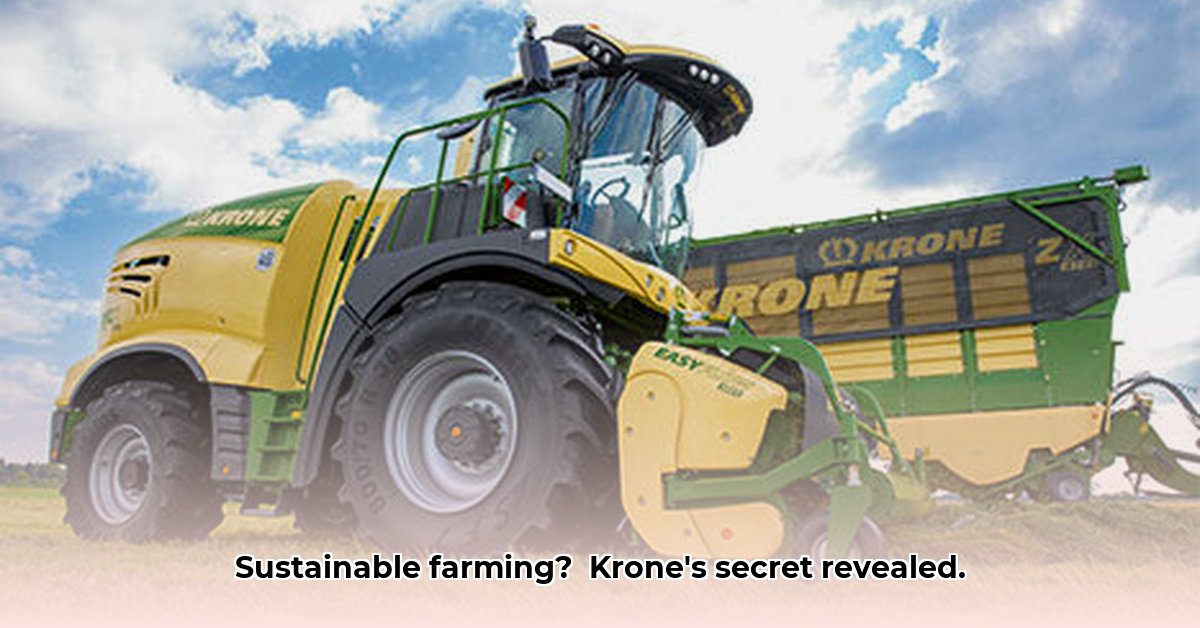
Krone tractors are a familiar sight in fields worldwide, renowned for their robust construction and high efficiency. But in an era of heightened environmental awareness, the question arises: how can these powerful machines contribute to a sustainable agricultural future? This article explores Krone's role in balancing agricultural productivity with environmentally responsible practices, examining technological advancements and future prospects. For more on different tractor types, see this helpful guide: Tractor Types.
Krone's Role in Modern Sustainable Agriculture
Krone's influence on agriculture is substantial, offering a broad range of equipment from small tools to large-scale harvesters. Their machinery is often synonymous with efficiency, enabling farmers to cultivate vast areas rapidly. However, this efficiency has historically come at an environmental cost. Larger machinery typically requires more fuel, leading to increased greenhouse gas emissions and soil compaction, which can negatively impact long-term soil health. This creates a crucial challenge: how can we harness the power of advanced agricultural technology without compromising the environment?
Balancing Efficiency and Environmental Impact: The Challenges and Solutions
The inherent trade-off between efficiency and environmental impact poses significant challenges. Larger, more powerful tractors enhance productivity but often consume more fuel, resulting in higher carbon emissions. Soil compaction from heavy machinery reduces water retention and nutrient uptake, harming the long-term health of the land. However, this challenge presents opportunities for innovation and significant advancements.
Precision Farming: Optimizing Resource Use
Precision farming, utilizing GPS and sensors, allows for precise application of resources like fertilizer, pesticides, and water. Imagine a Krone tractor guided by sophisticated software, applying inputs only where and when crops need them. This minimizes waste, reduces environmental impact, and optimizes resource use, highlighting the potential for efficiency gains and environmental stewardship. A well-executed precision farming strategy can show significant reductions in input costs and environmental impact.
Alternative Fuel Sources: A Path to Greener Power
Research into alternative fuels is paramount to the future of sustainable agriculture. Biofuels and the development of electric or hybrid tractor systems offer promising solutions. Envision a Krone tractor powered by renewable energy – a considerable step towards a sustainable agricultural model. While the technology is still evolving, the potential environmental benefits are substantial.
Full Lifecycle Assessment (LCA): Transparent Environmental Accounting
Conducting comprehensive LCAs on Krone machinery, encompassing all stages from manufacturing to disposal, is crucial for assessing and minimizing its environmental footprint. Transparency in this process fosters trust with farmers and consumers, demonstrating a commitment to responsible production. This data-driven approach helps identify areas for improvement and allows for more informed decision-making. The increased transparency will be a crucial factor in fostering trust among consumers who are becoming more environmentally conscious.
Strategies for Enhanced Sustainability: A Collaborative Approach
Moving toward sustainable farming requires a joint effort from multiple stakeholders.
Krone's Role in Driving Sustainability:
Krone's commitment involves significant investments in research and development. Prioritizing alternative fuel technologies and implementing sustainable manufacturing processes are crucial. Their initiatives like the eTrailer demonstrate a commitment to reducing fuel consumption and emissions.
Farmers' Role: Efficient Resource Management
Farmers must adapt by carefully evaluating the cost-effectiveness of different machinery sizes and adopting precision farming techniques. Responsible resource management practices are essential to balance productivity and environmental considerations. This includes careful planning and efficient use of inputs.
Government and Industry Collaboration: Policy and Innovation
Governments need to introduce policies that incentivize sustainable practices. Collaboration between Krone, other manufacturers, educational institutions and various organizations is essential to drive innovation and industry-wide adoption of sustainable technologies. This collaborative approach is key to overcoming challenges and promoting widespread adoption of sustainable practices.
The Future of Sustainable Farming: A Vision for Tomorrow
The future of sustainable agriculture envisions highly efficient, low-impact Krone tractors powered by renewable energy and guided by precision farming technologies. This vision necessitates continued collaboration, innovation, and a commitment to responsible stewardship of land and resources. The transition to a greener agricultural sector will improve productivity and minimize environmental impact.
Key Takeaways: Three Pivotal Points for Sustainable Agriculture
- Precision farming techniques significantly reduce resource waste and environmental impact.
- Transitioning to alternative fuel sources—like biofuels and electric power—is crucial for reducing greenhouse gas emissions.
- Transparent lifecycle assessments (LCAs) build trust and guide continuous improvement in sustainability efforts.
This journey to a greener future requires ongoing improvement, research, and collective commitment. The potential rewards – increased yields, decreased environmental impact, and a more sustainable future for farming – make the effort worthwhile.